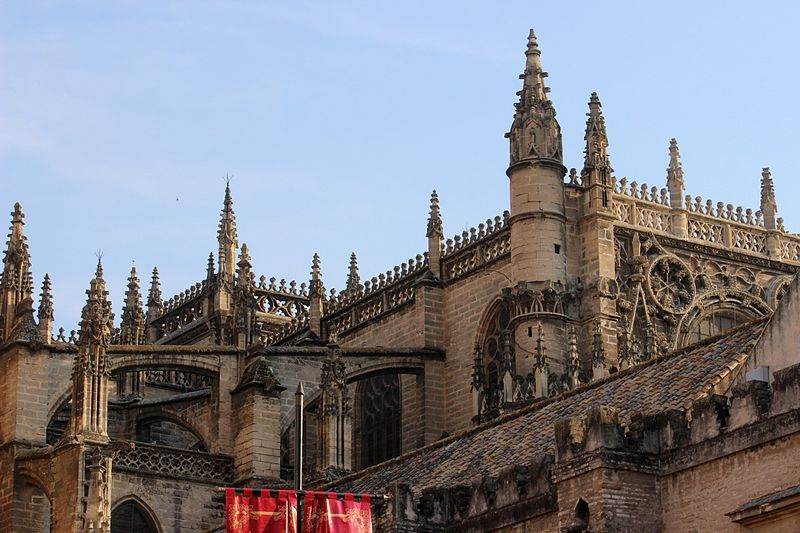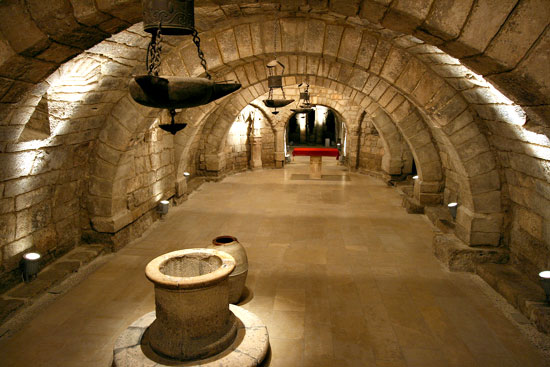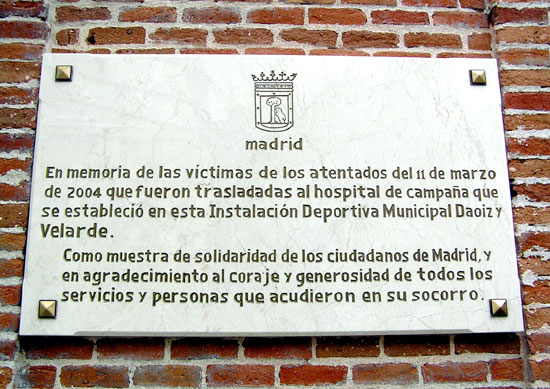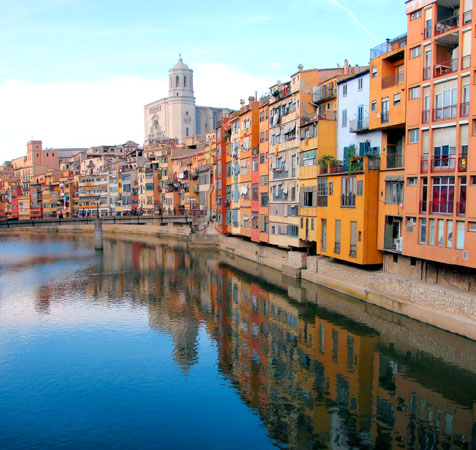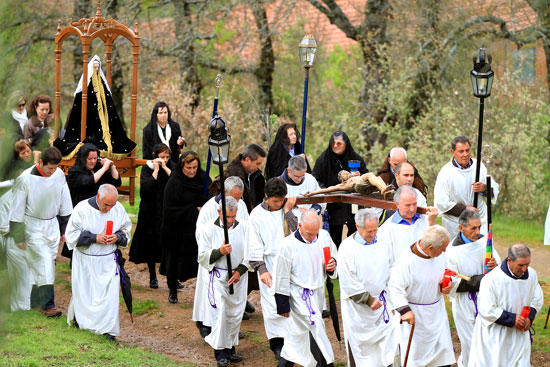Culture and Society: Religion Overview
Religions of the Country
Roman Catholicism is the predominant religion in Spain, representing almost all Spaniards. Muslims, largely expatriates from Morocco, Algeria, Pakistan, and other Islamic countries, make up a small percentage of the population, as do Protestants, Jews, as well as small minorities of Orthodox Christians, Mormons, Jehovah’s Witnesses, Hindus, Sikhs, Buddhists, and members of the Baha’i Faith.
Basic Tenets
Roman Catholicism, through its long line of leaders, starting with St. Peter the Apostle and continuing to the present day Pope Benedict XVI, regards itself as the legitimate inheritor of the ministry of Christ. Like most other Christian faiths, Catholicism is both monotheistic and trinitarian, following one God in three forms, the Father, the Son, and the Holy Spirit. It holds that Jesus Christ, the Son, died and rose from the dead to redeem humanity from its sins. It considers the Bible as well as church teachings and sacraments to be legitimate sources of revelation and grace. Catholics go through a period of study before they may receive the sacrament of the Eucharist, or Holy Communion, for the first time, as they believe in the real presence of Christ in the bread and wine.
It is not true that Catholics worship saints and statues, but many Catholics have a special affection for certain saints and may use images to focus their minds as they ask a saint to intercede for them in heaven. Human life is sacrosanct in Catholicism, and the Church therefore opposes activities like cloning, eugenics, euthanasia, and abortion.
Spiritually Devout or Nominal
Most Spaniards observe religious ceremonies like baptism and funerals, although they are not active churchgoers. Surveys between 2002 and 2006 indicate that, on average, around half of Spanish Catholics (including young and old) never attend church masses, 19 percent attend many times a year, 12 percent about once a month, and 15 percent every week.
Religious Conflict
In Spain, people from different religious sects have generally co-existed peacefully. The government provides equal status and opportunities to Catholics and followers of minority faiths.
However, religious harmony in Spain was fractured by the terrorist attacks against Madrid commuter trains in 2004, which killed 191 people and injured more than 1,800. The increasing fear of Islamic extremism has provoked anti-Muslim attitudes and behavior across the country. Instances of burning and throwing the Koran (the holy book of Islam) in the trash, vandalizing Islamic butcher shops, and arson attacks on several mosques and Islamic sanctuaries frequently occurred during 2005 and 2006.
Secularism
The Spanish Constitution is decidedly secular and the country has no national religion. Over the past three decades, secularist ideology has spread, and now almost 22 percent of Spaniards claims to be atheist or agnostic.
Superstitions
The Spanish have a wide range of superstitions. Spaniards commonly sat, "Jesús"when somebody sneezes; this stems from a belief that bad spirits are expelled when someone sneezes. Spaniards also believe that dancing seven times around the deceased will provide elevation and peace for the soul.
Certain superstitions are specific to particular localities. In Galicia, for instance, people out on a full moon night can be mesmerized by Santa Compaña (a procession of dead people) and be compelled to follow them for all of eternity. In defense one must draw a circle on the ground and enter it. In Madrid, unmarried women visit the small chapel of Ermita de San Isidro on the fifteenth of May and prick their fingers with pins to help them get a husband.
Religious Clerics
There are thousands of priests working in thousands of parishes in Spain. The Spanish Catholic clergy are members of the worldwide Roman Catholic Church, headed by the Pope in the Vatican. The county’s monastic orders contribute greatly towards primary and secondary education.
Minority religions (including Protestantism, Islam, and Judaism) also have a significant number of clerics in Spain.
The Royal College of St. Alban in Valladolid (founded 1589), the Major Seminary of the Archdiocese of Valencia (1831), the Pontifical Comillas University in Madrid (1904), and the Seminary of the Diocese of Terrasa in Catalonia (2006) are some of the most well known seminaries and theological colleges in the country. Statistics reveal that the number of individuals aspiring for priesthood and enrolling in theological colleges is gradually declining.
State Regulations
The Spanish government does not regulate the clergy. Under the 1979 concordat between the government and the Holy See, the Catholic Church used to receive financial support directly from the government and through voluntary tax contributions. In 2006, however, the Socialist government of Spain reached a new agreement with the Church and canceled all direct financial support.
Religion and Public Life
Religion has significant influence in Spanish public life. Although they are much less religious than in the past, Spaniards still derive much of their self-identity from the Catholic Church. Catholic churches, monasteries, museums, Cofradías (Catholic societies dedicated to patron saints), mass media (like the COPE radio station), and organizations such as Opus Dei and Legionarios de Cristo continue to reinforce the country’s history of religious traditionalism.
Local festivals and celebrations and the Easter processions conducted throughout the country are still major annual events and involve the parading of religious icons by penitents, dancing, women clad in mantillas (traditional black shawls), fireworks, and entertainment activities. The most popular of these are the Fiesta de San Fermín held in Pamplona in July (known for the "running of the bulls"), the Fiesta de la Mercè held in Barcelona in September, and the Fiesta de San Isidro, a three-week-long festival held in Madrid in May.
Religious Holidays and Ceremonies
National Catholic holidays in Spain include Epiphany (January 6), Holy Thursday, Good Friday, Easter, Assumption Day (August 15), All Saints’ Day (November 1), Immaculate Conception Day (December 8), and Christmas (December 25). In accordance with a 1992 concordat, the Spanish government also recognizes the religious observances of Protestantism (the Saturday Sabbath of Seventh-Day Adventists), Judaism (Holocaust Remembrance Day on January 27), and Islam (Eid al-Fitr).
Religious ceremonies mark most life events in Spain. These include baptism, first communion, confirmation, marriages, and funerals. Catholic marriages are traditionally performed in a church followed by elaborate all-night celebrations.
Government and Religion
The Spanish Constitution and government proclaim religious freedom for all and do not allow legislative or private interference into religious matters. Spanish laws and regulations do not reflect any of the country’s religions and there is formal separation of church and state.
Even though Spain is a predominantly Catholic country, the government is not aligned to the Church. On the contrary, the Socialist government in 2006 canceled part of the concordat earlier reached with the Vatican giving the Church direct financial support. The public schools and institutions of minority sects receive some funding from the government.
Persecution
The Spanish government does not persecute outside religions. The government equally facilitates the activities of Protestant, Jewish, and Islamic faiths through official agreements. It also confers necessary civil, economic, and judicial benefits to the religious groups on an equal basis.
It is not mandatory for any religious group to obtain a license from the National Registry of Religious Entities, but they often register as cultural organizations with the regional governments. Non-Catholic weddings are freely performed and granted civil validity in the Spain.
The number of foreign religious organizations and missionaries is growing in Spain, and there are no laws against religious proselytizing. All religious groups are allowed to impart public and private religious instruction to their adherents, establish places of worship, and conduct religious meetings. Anyone is free to possess or distribute Bibles and other religious literature and to display religious symbols or icons.
Religious Tolerance
There is religious tolerance in Spain, despite its history of fascism under Franco and the infamous Spanish Inquisition. The Roman Catholic Church generally has good relations with minority religious groups. The government, academic institutions, local authorities, and religious communities actively engage in promoting inter-religious unity and social integration. However, there have been some instances of anti-Semitism and Islamo-phobia in recent years in reaction to the increased activities of Islamic extremists and terrorists.
Foreign missionaries and evangelical groups will not face opposition in Spain, and the Spanish generally have a tolerant attitude towards proselytizing.
Protocols for Foreigners
Foreigners are free to participate in the religious activities and rituals of Spain. Non-Catholics attending Catholic Mass should dress modestly and refrain from taking the communion bread and wine.
Copyright © 1993—2024 World Trade Press. All rights reserved.

 Spain
Spain 